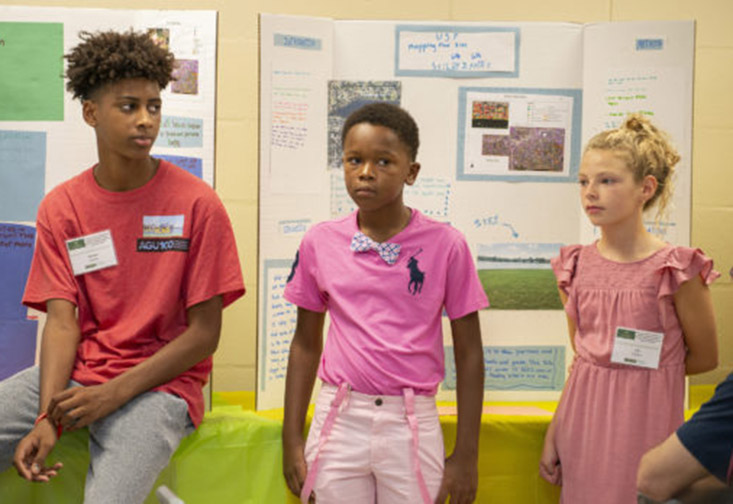This summer, eighteen middle and high school students from south St. Petersburg gained a relevant hands-on learning experience; analyzing flooding scenarios and devising solutions in their own backyard.
Led by USFSP Professors Barnali Dixon and Rebecca Johns, the Mapping Flood Vulnerabilities and Solutions workshop taught students to analyze flooding in streets and neighborhoods around the city. Students learned to observe flooding events and develop technological skills to assess causes and effects. At the end of the program, which was put on by the Initiative on Coastal Adaptation and Resilience (iCAR), students presented infrastructure solutions and recommendations to local officials and city planners.
“This workshop provided a free opportunity for kids from south St. Petersburg to learn some technology skills in the context of flood risks in their own neighborhoods,” said Johns, Professor of Geography and Director of Community Outreach and Education for iCAR. “The project was amazing, and the kids were awesome.”
The workshop kicked off in May with a day of orientation, followed by an introduction into the causes of flooding and ways it can be assessed. Students were introduced to cutting-edge technologies, such as GPS (global positioning system) and GIS (geographic information system), as well as methods scientists use to study the geophysical environment.
“Our goal was to promote environmental science throughout the community,” said Dixon, Professor of GIS and Remote Sensing and Executive Director of iCAR. “This was a great opportunity for students to see and study the environment around them, including things they usually wouldn’t pay attention to until they are literally stuck in the water.”
Equipped with high-end GPS systems, students mapped and recorded flooding in south St. Pete during two days of fieldwork. They were tasked with identifying landscape features that might impact the way water flows following a storm and were challenged to consider what changes could be made to reduce flooding.
“We visited locations where we knew flooding occurred and tried to identify why flooding was a problem there,” Johns said. “The students learned to look at things like elevation, whether drains were clogged or even if a drain was missing.”
During lab days at USFSP, the students input their fieldwork data into software that helped them to create a reference map of where flooding is likely to occur. Students were also encouraged to recommend solutions for ways to mitigate the flood risks they observed.

It was these reference maps, solutions and other findings that students presented to family, friends and city and county officials in July.
USFSP students and alumni helped facilitate the seven-week workshop by supporting faculty and teaching students to use the GPS and GIS tools. Crystal McClendon, a senior Environmental Science and Policy major at USFSP, served as a teaching assistant and community liaison. McClendon’s two sons, aged 11 and 13, participated in the workshop.
“I was so excited for this event and to see kids have access to things they otherwise wouldn’t have access to,” she said. “They learned about things I didn’t learn until college. It was great to introduce them to this at such a young age.”
The workshop was funded primarily by a grant from the American Geophysical Union. Additional support was provided by the American Society for Photogrammetry and Remote Sensing, Quantum Spatial, Tampa Bay Estuary Program and the Joint Institute for Gulf of Mexico Studies.
“Getting the next generation of students to become effective leaders, who can discuss solutions for some of our most vexing community issues, such as stormwater and flooding, is vital for our region,” said Ed Sherwood, Executive Director of the Tampa Bay Estuary Program. “It will ensure that our work to protect the Tampa Bay estuary is sustained into the foreseeable future.”
Sherwood noted the creative approach some students took to the real-world problems they witnessed.
“Several students highlighted the need to ‘think out of the box’ when dealing with flood-prone areas in our community,” he said. “For instance, two students suggested diverting flood water to storage tanks and then releasing it slowly to our stormwater systems. These are exactly the type of ‘green infrastructure’ solutions that will be needed to reduce environmental impacts stemming from stormwater in our urban estuary.”
